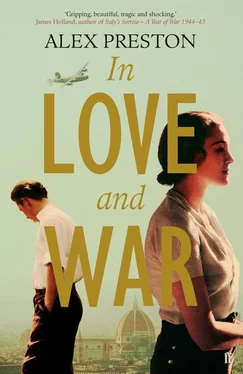Goad gave me a talking to. About how ill-advised it was for a Brit to be consorting with a Jew. We are under significant scrutiny, and this is just the sort of performance that might tilt it all against us. He apparently assumes it’s been going on for some time. He gets terrible itching on his hands when he talks about this kind of thing; he sits there and I can feel the pressure to scratch building up inside him until it’s unbearable. Then he gives a rub, runs the back of one hand down the tweed of his thigh. Poor fellow. I can’t remember what I said to him. Mumbled apologies, told him it wasn’t anything serious, that it was in response to the moment, to her tears.
It’s time to turn in. I’ve found it hard to get Ada out of my head. I tried to telephone her earlier, but there was no answer. Something makes my chest suddenly too small for my heart when I think of her. She’s been the anchor tying me to Florence. It’s a better excuse than ennui, anyway. I’m reading Benedetto Croce. “Historical judgement is not a variety of knowledge, it is knowledge itself; it is the form which completely fills and exhausts the field of knowing, leaving no room for anything else.” Not easy. Buonanotte .’
8 . A-Side:Esmond Lowndes: Milton in Italy, 1638–39 (30′ 21″)
B-Side:‘Hell. Bugger, as Gerald would say. I’d meant to record these things more often, but so much has been happening, and every night Bailey and I sit up planning and plotting, trying to sort our way through the mess that’s unfolding across Florence and Europe. So what has happened in the six weeks since my last direct-to-disc? I’ll start with the pathetically personal and broaden to the faintly historic. You’ll want to know, whoever-you-are, what is going on between me and the admirable-stroke-terrifying Ada Liuzzi.
I join you in your curiosity and only wish I could help. She came in the next day, the day after our kiss on the bridge, and every broadcasting day since, maintaining an air of chilly professionalism, resisting offers of after-work drinks and dinners and dances at the Maggio Musicale and, indeed, that far-off look has barely left her face. Only once, when we ran into each other on the via Porta Rossa, I coming back from dinner with Friedrich Kriegbaum, she from a concert in the Cascine, did I sense a crack in the froideur . A heavy rain squall came down over the city, as if the Arno were flowing upwards. Everyone was hurrying with their jackets tented over their heads, and I ran straight into Ada. Her eyes lit up for a moment when she saw me, and I could tell she was a little drunk, very wet. I took her hands and she didn’t snatch them away immediately. I kissed her cheek but close enough to the corner of her mouth that she could have turned it into something more had she wanted to. She almost did. I’m stricken, really. It is pathetic, to have fallen for someone like this, and to betray myself in so many trite, adolescent ways. I try to manoeuvre opportunities for us to work together, just the two of us; I’ve been waking from elaborate rescue dreams in the small hours, whisking her out of Europe on the back of a white charger.
I call her when I’m drunk, but she never answers.
My mother’s a gaolbird! Mosley was arrested first, then most of the rest of the active British Union. There was even talk of father doing clink, but sense seems to have prevailed there. At least mother’s back in Britain. Seems the realities of war broke up the hiking party in Berchtesgaden. It was decided that the squawking posse of English matrons surrounding the Führer were an unnecessary distraction. Hess drove mother and Diana Mosley to the aerodrome himself. They were picked up as soon as they set foot on British soil. They’re in Holloway Prison with Mosley, all three of them in a cosy little cabin of their own. Extraordinary that five years ago there was talk of these people running the country.
Mussolini, the hunter in the field, has finally pulled the trigger. Italy is at war with Britain and France. What does this mean? A final exodus of Brits from Florence. A host of women called Gladys have left, although my favourite of them, the indomitable Gladys Hutton, has said she’ll stay no matter what. Bailey and I have been frantic, sorting passports for ancient coves living in isolated splendour above Monte Oliveto, persuading Gladyses they can’t take their entire wardrobes with them on the train, then hauling suitcases around the station like porters, ordered about by women in pince-nez who colonise their railway carriages like their uncles colonised Poonah.
Goad has moved into the church apartments, a room on the ground floor. He’s not well — I suppose you’d call it nerves. He’s convinced that, if he’d had more support from his superiors, if he’d been allowed to continue at the Institute for a little longer, he’d have been able to prevent Musso from getting into the war. He writes thick letters to Lloyd George and Churchill and Duff Cooper, but you can’t think they’ll ever be opened, let alone read. He comes up and joins us some evenings, sits ghostly at the table worrying his food while we plan the latest evacuation. He’s been hearing noises in the night, too. A baby crying, rustling footsteps, coughing. He thinks it’s part of his illness. Perhaps it is.
As for the Italians declaring war, that’s simple — pure opportunism. Mussolini saw which way the tide was turning and jumped. They’ll be eating strudel and raising steins on Piccadilly before the end of the year, unless the Americans help us out. Finland, Belgium, Norway have fallen; France has all but gone — there are Germans on the Champs-Elysées, the Brits ferried back from Calais in fishing sloops. If it’s all over this year, or early in ’41, the Italians will need to show they deserve a seat at the table alongside the Russians and the Germans. That’s why they’re fighting.
Pavolini called me up last night. With Goad ill, I’ve been making the broadcasts myself. Apart from the prescribed guff, I’ve been trying to stay away from matters political, rehashing my notes from F. R. Leavis’s lectures, speaking about Shelley and Yeats. Pavolini was awfully pally, described me as a key asset . But he pointed out that the raison d’être for Radio Firenze was now something of a nonsense. Rapprochement between the Brits and the Italians being, for the moment, off the table. He’s given me a plan for the next six weeks of programming. Italian poets, German composers, even more propaganda. Two days devoted to Balbo, the great Italian air hero shot down by his own troops in one of these absurdly antiquated Fiat biplanes that make up the Italian air force.
I imagine I’ll eventually find myself heading back to a Britain changed beyond recognition with — who knows — Mosley as Commander of the British Reich or some such. In the meantime, I’ll keep my head down and concentrate on those few small things I can do to help push back that frightful prospect. Good night, whoever-you-are.’
9 . A-Side:Esmond Lowndes and Friedrich Kriegbaum discuss Bach’s Goldberg Variations (33′ 33″)
B-Side: The Battle of France is over; I expect that the Battle of Britain is about to begin . That was my Churchill voice. He’s bloody good, actually. Much better than Chamberlain, hoisted by the petard of history. Churchill’s a bit more like it — feels as if he’s up for a fight. I’m no good at accents, really. Just listen to my Italian. I know the words all right, but can’t get myself to sound like a local. It’s partly why I’ve become something of a recluse, hiding from the Blackshirt gangs who’ve grown in number and aggression since war was declared. Mostly bitter older men, veterans from the last war looking for a reason to pull on a uniform and biff people up. Sound familiar?
Читать дальше












